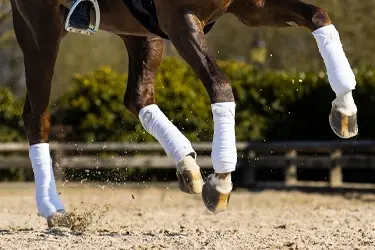Hyaluronic acid for your horse: these are the benefits
Your horse's joints are very important, especially if your horse does intensive work. From the inside, you can support the joints with certain substances, such as Hyaluronic Acid. But what does this mean and what does it do for your horse? We will gladly explain it for you below.
What is hyaluronic acid?
Hyaluronic acid is an endogenous substance found in the joints of both humans and animals. In every joint there is a thick, sticky substance called joint fluid. This fluid serves to lubricate the joints and keep them supple. Among other things, this synovial fluid contains Hyaluronic Acid which retains moisture well, this is important for the lubrication of the joint. Despite the fact that this substance already occurs naturally in the horse's body, administering a supplement with hyaluronic acid can provide additional support for a horse's joints.
The benefit of supplemental hyaluronic acid for horses
Hyaluronic acid contributes to the quality of synovial fluid to keep joints moving smoothly. Joint fluid reduces friction in the joint and this prevents wastage on cartilage. Cartilage is a form of connective tissue located on the ends of bones that provides cushioning for the musculoskeletal system. This cushioning provides smooth movement. There are horses that can benefit from additional hyaluronic acid. In some cases, the body's own production of hyaluronic acid is insufficient or the joints are subjected to a little more stress. This can reduce the amount of synovial fluid which can cause symptoms such as pain and stiffness. Hyaluronic acid in this case can support a horse's joints to keep them optimally healthy.
Which horses are in need for extra hyaluronic acid?
But how do you know when a horse needs extra hyaluronic acid? There are a number of horses that may need extra support.
Older horses
In general, the joints of older horses are just a little weaker after years of loading. As horses age, the amount of synovial fluid decreases. This can result in wear and tear of the cartilage leading to pain symptoms. Extra hyaluronic acid supports the production of synovial fluid, allowing joints to remain supple for longer.
Horses with long-term joint disorders
Horses with osteoarthritis , arthritis or OCD generally have weakened joints. Sufficient synovial fluid can support horses with long-term conditions and reduce pain. Unsure if your horse has a joint disorder? Always consult a veterinarian.
Sport horses
Sport horses perform intensive work which can cause overexertion. It is important for these horses to have enough lubrication in the joints. Overexertion and a lack of synovial fluid can gradually damage the cartilage. For this reason, extra hyaluronic acid can provide good support for a horse's joints.
How to feed hyaluronic acid
There are several ways to give the horse hyaluronic acid. An easy way is to give it as a supplement. When hyaluronic acid is given in combination with other ingredients that have a positive effect on the joints, you achieve the best results. PrimeVal Gelatinaat liquid contains, in addition to hyaluronic acid, collagen hydrolysate type I and II, glucosamine and MSM that support the joint. This supplement is easy to administer over the feed. In addition to supplements, a veterinarian can give the horse an injection in which hyaluronic acid is injected directly into the joint.
Also interesting

Omega 3-6-9 oil for a healthy skin and shiny coat

How to keep your horse's joints supple and healthy

All PrimeVal products are doping-free




